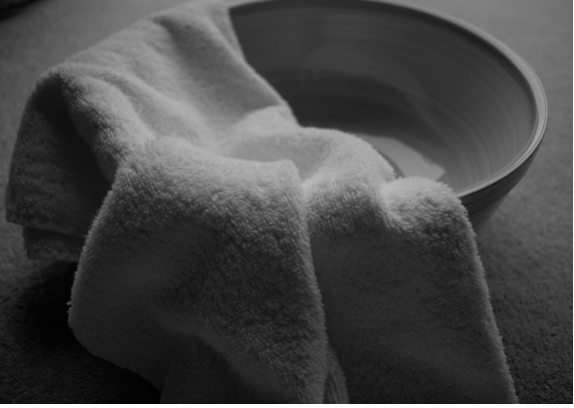by Carol Dixon
One of my favourite versions of the Prayer of St Ignatius Loyola is a musical version by my friend, Revd. Sheila Hamil, and includes some beautiful pictures of the Isle of Lindisfarne just off the Northumberland coast where saints of old learned to serve God in ways relevant to their time just as we need to discern what it means to serve God in ours.
[© Sheila Hamil. Used with permission]
Over the past year we have had plenty of opportunity to think about what a life of service means – from the overstretched National Health Service and the individual small acts of kindness in our neighbourhood to the big issues debated in the press regarding the nature of Public Service by our politicians or Service to the Crown as defined by the Royal Family.
A life of service isn’t always easy and motherhood is a good example of this. I was blest with a wonderful mother who always put the family’s demands before her own. Now I wasn’t a natural mother at all, yet through God’s grace I learned to serve the needs of my family without resentment and even with joy. On my own there is no way I could have done this but through God’s grace (and a lot of prayers) God turned me from a selfish person to a serving one as I tried to do what was best for my children. I didn’t always succeed but at least it worked some of the time and my children have turned out to be loving, caring adults who in turn care lovingly for their own kids. In the UK we celebrate Mother’s Day in March and use the opportunity to say thank you to our mothers by giving cards, flowers or small gifts as appreciation of their loving care for us over the years. Two years ago, I was invited to take a service on Mothering Sunday and I came across the following wonderful prayer (© URC Prayer Handbook altd.):
A Mother’s Day Prayer
Creator God, you are our Father and our mother.
We thank you for calling us to be in a relationship with you.
You care for us intimately throughout life.
On this Mothering Sunday
we give thanks for mothers and for your gift of life.
We thank you for the many moments which mothers
played a part in nurturing their children by their faith and service.
Creator God, thank you for the loving gift of mothers.
We thank you for our experience of mothering in our lives:
For women and men who have loved and cared for us,
who have nurtured us and provided for our needs,
who have been there whenever we called out,
and in whom we have placed our trust.
Today we pray for mothers
who are wearied through caring for others,
who are separated from their children,
who are struggling to juggle work and family life,
who are anxious about what the future holds.
L. Loving, mothering God, R. Hear our prayer.
We pray too for women who long to be mothers –
those unable to have children,
and for women for whom motherhood
is a burden rather than a joy.
L. Loving, mothering God, R. Hear our prayer.
We pray for the people who find today a sad or difficult time.
We pray for families who have lost a partner, a parent or a child;
we pray for single parents, for grandparents and extended families.
We pray for families where children or parents have special needs..
and for families where mental illness has led to a loss of memory and recognition.
L. Loving, mothering God, R. Hear our prayer.
We thank you God for families
where children are well happy and full of life.
On this Mothering Sunday, we give thanks for our Mother Church:
for our experience of being loved by a family
that is as wide and broad as the human race.
We give thanks that we can all practise your mothering gifts
as we live and grow in the family of the church.
Here we can learn to be welcoming and comforting,
to share our experiences, to listen to each other,
and to grow in grace and love.
Creator God, on this Mothering Sunday
we give you thanks for the gift of caring
which you have bestowed on us all
through the example of the love and sacrifice
of Jesus, our Servant king. Amen.
During lockdown while we have been permitted only to go out once a day in our local area for exercise, essential shopping or medical appointments, my escape in the dark evenings has been re-watching the BBC TV series Merlin which was first screened about 12 years ago. Like the Harry Potter stories it picks up on the great themes of life: good versus evil, and love & loyalty versus hatred & betrayal. The main character, the teenage Merlin has great powers of magic which happens to be banned in the kingdom on pain of death so he doesn’t know why he has been born with this gift or what he should do with it. By chance he becomes the servant of Prince Arthur who at the time is an arrogant prat – not the great and honourable king of legend that he is to become. These two young lads rub along together in a most amusing manner as they try to discover what they are truly meant to be, with Merlin secretly saving Arthur’s life on many occasions through the use of his hidden power, while all the time doing the most menial tasks and acting as the butt of Arthur & the knights’ jokes. It is only at the end, when Arthur becomes the great king he was intended to be and saves the kingdom with the help of Merlin’s abilities that he realises just how powerful Merlin is and how much he owes to him. ‘Why are you still acting like a servant?’ He asks Merlin as he lies dying ‘When you have all this power’. ‘It’s what I was born for’, Merlin replies. ‘ Your destiny was to be a great king and save the kingdom. My destiny is and always has been to serve you.’
As Christians we are called to serve our great king, Jesus, who knelt before his disciples and washed their feet as a symbol of true servanthood and gave his life for each of us so that we might fulfil our destiny to become the children of God. Through the Holy Spirit we are empowered to help bring about the kingdom of God on earth in the here and now by living lives of loving service, following the example of our Lord and Saviour who banished the darkness of sin and separation through the light of his sacrificial love.


